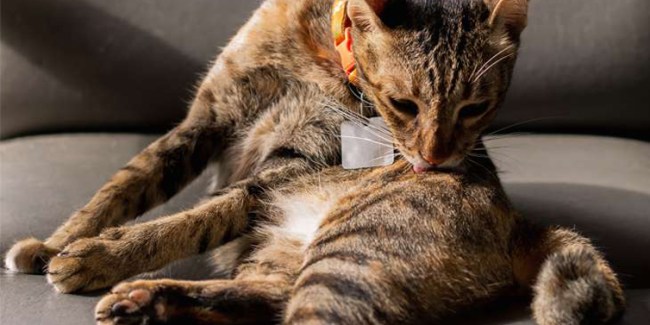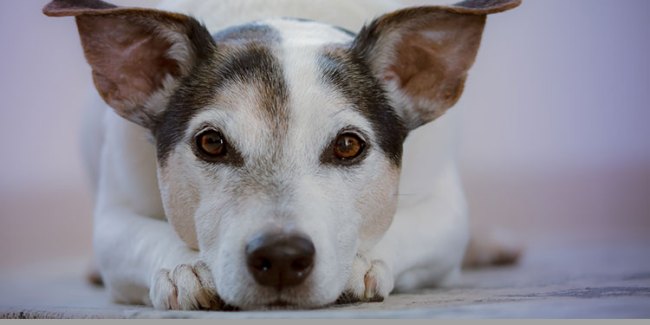Check-Ups and Vaccinations for Dogs
A question sent to a pets’ health magazine:
I have a very healthy and happy 4-year-old collie, who has been to the vet exactly twice in her life: once as a puppy for a check-up and vaccinations and once when she had a cut that turned septic. I’ve read that she should in fact be going for yearly check-ups and vaccinations. Isn’t this perhaps a money-making racket? If she’s healthy, with no symptoms, why does she need these check-ups? And why does she need all these vaccinations? I’m a pensioner and cannot afford treatment unless it’s necessary.
Could you please explain if and why annual check-ups and vaccinations are really necessary?
Thank you.
Barbara
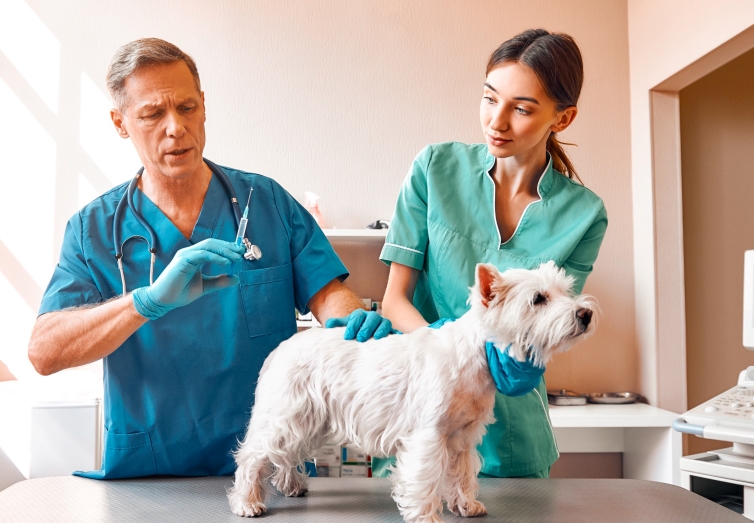
Here is the reply from the magazine’s expert:
Good day, Barbara.
Thanks so much for your query. There are many pet owners in South Africa who are on limited budgets and who question the need for these check-ups and vaccinations when their pets are apparently healthy.
Let’s look at some of the reasons for these. I’ll try to answer your questions separately.
Why are annual check-ups necessary?
Our furry friends age is multiplied by approximately seven “dog/cat years” for every human year. This, of course, varies: kitties and small breed pooches tend to age slower than large breed dogs. Most dogs reach adulthood by the age of two and by the age of four they are entering middle age. By the time they are seven, dogs are considered to be seniors.
So, health problems can occur in comparison to us, a very short length of time. To put this into perspective, if you bring your pet into the vet once a year, he/she will have aged seven human years since the last visit. The risk of certain diseases, such as diabetes, arthritis, cancer, obesity and kidney disease, increase with age. In an annual check-up, your vet will be able to detect and treat certain illnesses and even prevent them.
Why do we need to vaccinate our dogs?
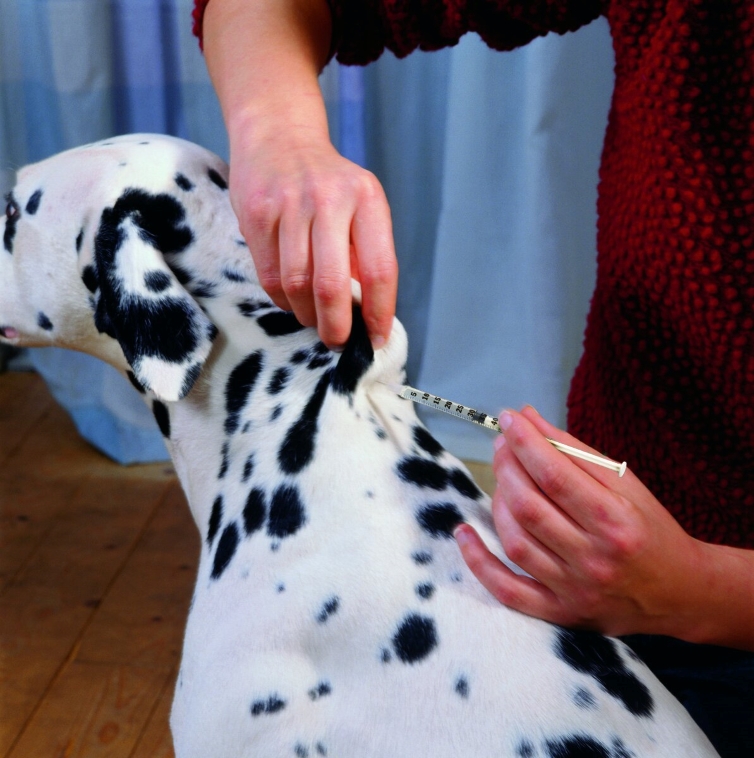
Puppies get immunity from certain diseases from their mothers, which starts to wear off around 6-12 weeks. After that, your puppy depends on you to provide protection in the form of vaccinations. Not only is the puppy protected but humans are also protected from catching certain diseases from them. These vaccinations need to be boosted or updated regularly. In an annual check-up, vaccinations will be kept up-to-date during your pooch’s lifetime.
What are vaccines and how do they work?
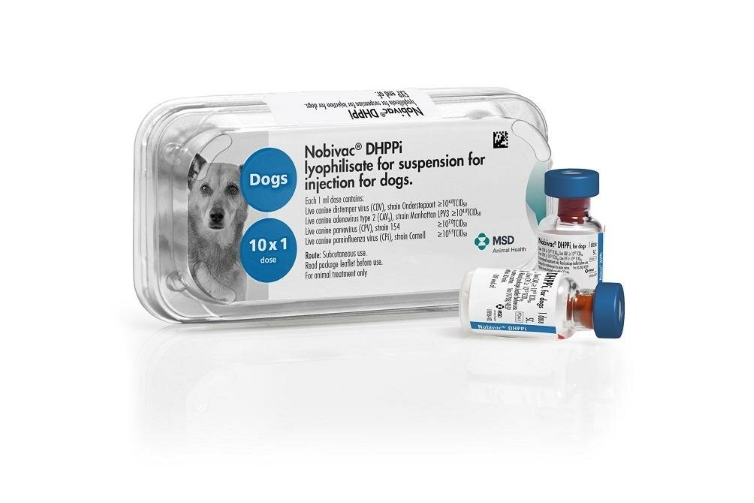
Vaccines contain antigens which ‘pretend’ to be certain disease-causing organisms in your pet’s body, but in a much milder and safer way. The cells in your pet’s immune system seek out these antigens and start to build-up a defence against them. These defence cells are called antibodies and their sole purpose is to fight the disease-causing organisms. In the future, your pet may be exposed to this disease, but the antibodies in the immune system can then fight off the infection quickly, often without your dog experiencing any symptoms.
This sounds like a ‘no-brainer’, right? It certainly is!
So what are the serious diseases that we need to vaccinate against in dogs?
Let’s look at the first vaccination your puppy is likely to get:
The 5-in-1 Vaccine
This vaccine is considered to be a core vaccine, which means that all dogs should receive it, whatever their lifestyle. It is often referred to as DHPP, DAPP or DA2PP, to indicate the diseases it protects against.
This vaccine provides protection against several diseases which are all caused by viruses with no known cure and which are highly contagious.
Puppies, after 6 weeks of age, should be vaccinated every 2-4 weeks, until they are 16 weeks old. They will need booster doses of the 5-in-1 vaccine every 1-3 years, depending on the recommendation of your vet.
- Rabies
Rabies is spread through contact with an affected animal’s saliva, through bites, and via any break in the skin. This deadly virus affects the central nervous system of all mammals, including humans. In animals, there is no cure for this disease and the symptoms cause great suffering. Unvaccinated human/animal cases, even with treatment, have not survived. So it is obvious that you’ll want to vaccinate your pet against it.
- Canine Distemper
This virus is highly contagious (but not to humans and cats) and is usually spread between dogs through discharges from the eyes and nostrils. It is extremely serious, difficult to treat and usually fatal. This horrible virus attacks the central nervous system and often causes permanent damage even if the dog survives it. Symptoms usually start with not wanting to eat, tiredness, discharge from the eyes and nose, then vomiting, diarrhoea, struggling to breathe, then seizures, paralysis and death. The vaccine is part of the 5-in-1 vaccine.
- Canine Parvovirus
This disease often affects unvaccinated puppies from 6 weeks to 2 years of age. It is very infectious and can live in a garden for up to 2 years. It is spread through infected faeces. Symptoms include vomiting, diarrhoea, not eating and fatigue. Infected dogs usually need to be hospitalized with a drip and medication. Vaccination does not prevent dogs from contracting this virus but vaccinated dogs rarely die from this virus. The vaccine is part of the 5-in-1 vaccination.
- Canine Parainfluenza Virus
This particular virus affects dogs’ ability to breathe and can be involved in causing canine cough. It is highly contagious and spreads rapidly in kennels where there are many dogs close together. Symptoms include: a hacking cough, sneezing, a runny nose, eye inflammation, loss of appetite and fatigue. It is not usually fatal unless the dog has other health issues. The vaccine is part of the 5-in-1 vaccination.
- Canine Cough
A variety of highly contagious viruses and bacteria are involved in canine cough. It is often found when dogs are in close proximity to each other. It is not usually fatal but can lead to serious conditions such as bronchopneumonia in puppies and bronchitis in older dogs. It is spread through direct contact with infected dogs, through aerosol droplets and through contact with infected surfaces. Symptoms include a loud, dry cough which continues over 10-14 days.
Canine cough is a syndrome including a number of causative agents of which Parainfluenza is just one. Therefore, additional vaccines to the 5-in-1 vaccination will be required to provide the broader form of protection required. Ask your vet about
Nobivac® KC or Nobivac® Respira Bb.
What does the vet look for in the yearly examination?
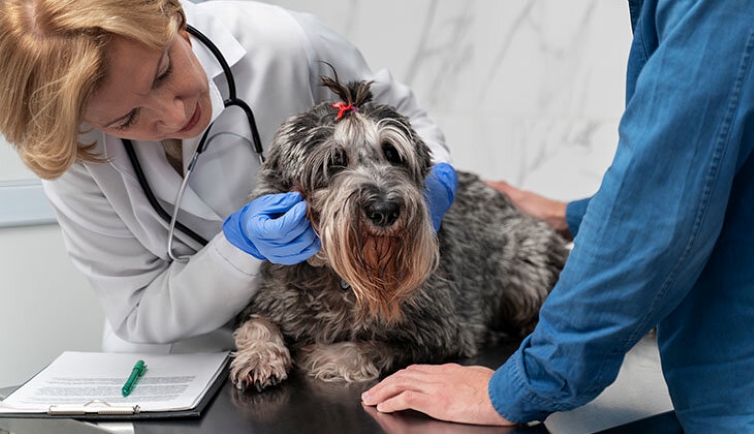
A full clinical examination will be done, from the tip of your pooch’s nose to the tip of his/her tail. The vet will look for signs of certain conditions which may suggest the beginnings of a disease.
Your vet will usually look at:
- your pet’s general state of alertness;
- the condition of your pooch’s skin and coat, including any signs of nasty little free-riders, otherwise known as parasites;
- the condition of your doggie’s teeth; this is very important because dental health is strongly linked to physical health;
- your pet’s ability to move and his/her posture;
- the condition of your pet’s eyes, pupils and tear ducts;
- your pet’s heart and breathing rate; certain muffled heart sounds may suggest a murmur or may be signs of heart valve disease;
- the mucous membranes, like the gums and inner part of the lower eyelid;
- the condition and appearance of the ears;
- the condition of the abdominal organs. An abdominal palpation (feeling carefully with the hands) will usually be done. The vet will place his/her hands on either side of the body and slide his/her hands slowly backwards, feeling for any possible abnormalities.
- Your pet’s temperature will be taken to rule out possible infections or fevers.
Additionally, your vet may take blood, stool and urine samples if any problems were found during the physical examination.
Through regular check-ups, your vet will get to know your poochie, so that slight problems may be identified before they become bigger problems. Any health concerns can be addressed early which will improve the prognosis and make treatment easier.
What if I skip these annual checks and vaccinations?
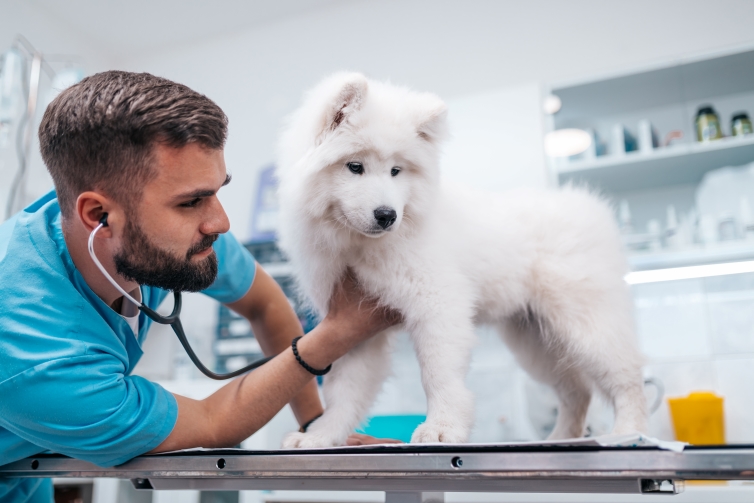
A recent South African report indicates that half of all pet owners do not visit their vet regularly for check-ups and vaccinations and over a third only visit their vet when their pet is showing signs of illness or injury. Bravecto® SA Vet, Dr Mats Abatzidis, says that this is not due to pet owners being irresponsible – our fast pace of life sometimes gets in the way.
In addition to this, it is often difficult to identify illness in pets until physical symptoms occur – we don’t always know when our pets are in pain or feeling sick. This can be avoided with regular, annual check-ups. And don’t be tempted to “Google” symptoms. Unfortunately, as most of us know, there is a lot of misinformation online and simply looking for your pet’s symptoms, diagnosing and treating them ourselves can be very dangerous.
In closing, Barbara, I do hope that I have addressed all of your concerns and that you now realise why annual check-ups and up-to-date vaccinations are so important for the health of your pet.
With best wishes.
ZA-BRV-230900002
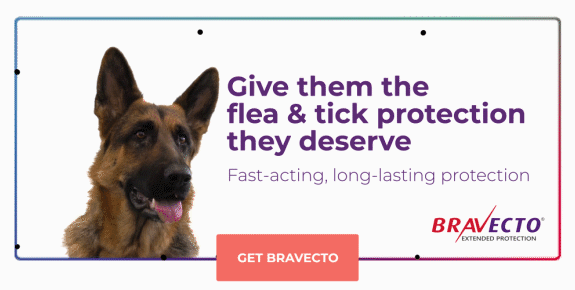
Subscribe to our Newsletter
Get to know your furry friend better! Sign up for all things dog- or cat-related.
The Hairy Facts about the dreaded hairball
12 April 2021
Help! My dog’s barking mad! Volume 2
12 April 2021
Your Itchy, Scratchy Cat – All About Cat Skin Problems
12 April 2021
The Dog’s Diet: A Bone of contention?
01 April 2021
Mango Fly Worms: How to Spot and Eliminate them
Posted on November 28,2019
Managing Mange And Mites In Your Dog
Posted on June 11,2018
Why Do Cats Purr and How? Learn What Your Cat Is Saying
Posted on October 14,2020
How to Get Rid of Ear Mites in Dogs
Posted on November 06,2019




